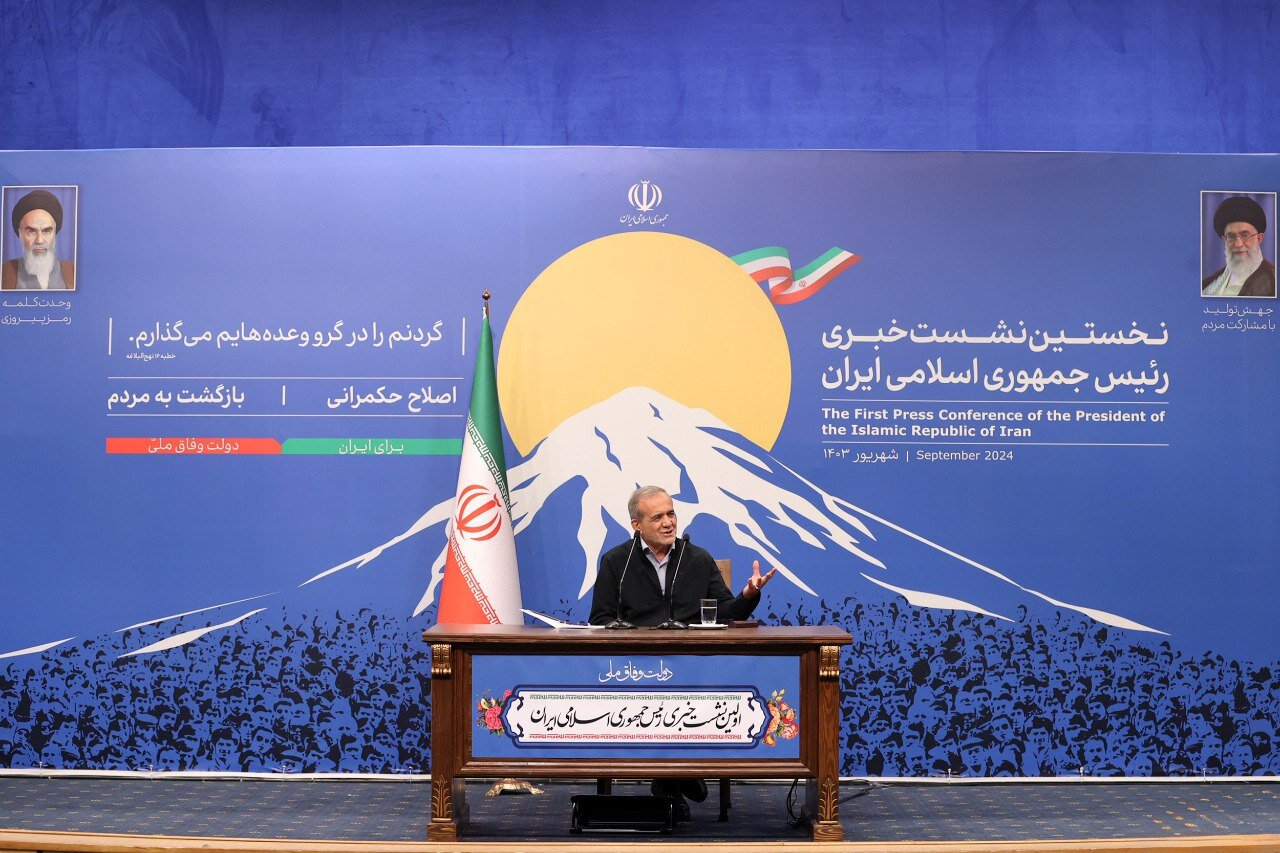Iran president: No nukes, but missiles stay

TEHRAN – In his first-ever press conference since taking office in July, President Masoud Pezeshkian affirmed Iran's right to possess defensive capabilities, while unequivocally stating that the country is not pursuing to build nuclear weapons.
The press conference, attended by representatives of over 100 media outlets, was held on Monday in Tehran. It encompassed a wide range of issues and topics, including Iran’s foreign policy under its new president and the approach it plans to take regarding tensions between Tehran and Western states.
In response to a question from a Russian journalist, Pezeshkian reaffirmed Iran's commitment to peace, asserting that the country has no intention to build nuclear weapons. He pointedly stated, "We are not seeking nuclear weapons. It is they [Western leaders] who threaten us." Further addressing the issue of Iran's military capabilities, Pezeshkian challenged Western calls for limitations, stating, "They say we should not have missiles; fine, if we shouldn't have missiles, then disarm Israel."
The official added that Iran has never been the initiator of any war and that it needs to have a robust military to defend itself against notorious aggressors like Israel. “They want to disarm us so they can do to us what they're doing to Gaza.”
In a call for diplomatic engagement with the West, particularly the U.S., he expressed openness to dialogue, saying, "If the U.S. respects our rights, we have no issues with the U.S. or any other country." However, he cautioned against perceived threats and disdain, declaring, "We should not be threatened; we will not accept contempt and threats."
Despite over four decades of Western sanctions aimed at crippling its economy and hindering its progress in various sectors, Iran has made significant strides, particularly in the military realm, where it has emerged as a leading producer of missiles and drones. Iran’s military advancements seem to be a hard pill to swallow for the West, which has been calling on Tehran to scale back on its capabilities to help preserve “peace” in West Asia. Iran, however, has said numerous times that it has the right to defend itself in the face of growing terrorist and Israeli threats.
Yemen self-reliant in attacks against Israel
During the Monday presser, Pezeshkian addressed claims suggesting that Iran has provided hypersonic missiles or technology to the Yemeni armed forces by refuting the idea that such advanced weaponry could be transferred unnoticed, stating, "It takes a week for human resources to go to Yemen. How could the missile have gotten there without being seen? We do not have any missiles that the Ansarullah in Yemen have used against Israel."
The President asserted that while Iran possesses sophisticated missile capabilities, it does not supply them to Sana’a. “Yemen had already been developing its own missile manufacturing technology prior to the onset of the Gaza war. Their ability to resist and manufacture missiles did not develop overnight.”
The Yemeni Armed Forces on Sunday struck a military target in the Jaffa area, south of Tel Aviv, with a new hypersonic ballistic missile. The attack exposed flaws in Israel’s missile systems as the regime's air defenses failed to destroy the ballistic missile. Israeli Prime Minister Benjamin Netanyahu, whose army has not yet managed to tackle the Lebanese Hezbollah’s continued attacks on northern parts of the occupied territories, blamed Iran for the success of Yemen’s attack.
Tehran looking to strengthen ties with neighboring countries, China, and Russia
In separate Remarks, the Iranian president declared his administration’s determination to bolster relationships with neighboring countries and friendly nations, especially China and Russia.
He pointed to his earlier trip to Iraq, stating that the visit resulted in agreements to undertake joint projects, a strategy that the President believes can be replicated with other neighboring nations, including Pakistan, Azerbaijan, and Turkey.
The President also addressed the evolving relationship between Iran and China, noting that their ties have been fruitful thus far. He pointed to China's pivotal role in mediating discussions between Iran and Saudi Arabia, which he described as a significant step toward regional coordination.
Pezeshkian made similar remarks on Tehran's relationship with Moscow, emphasizing that the two nations share substantial connections across economic, strategic, cultural, and military dimensions.
By Mona Hojat Ansari
